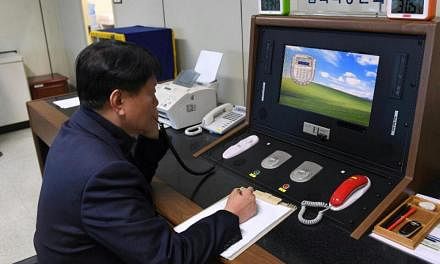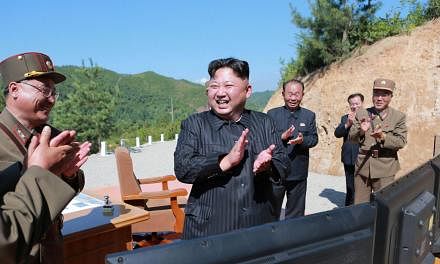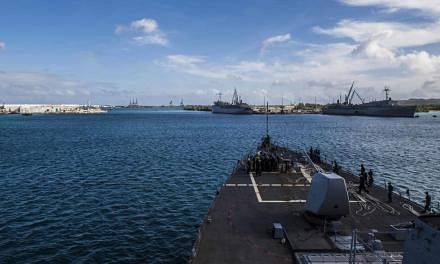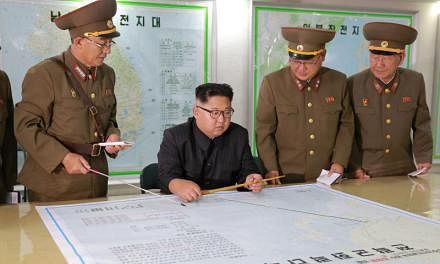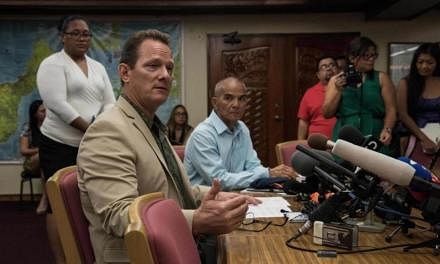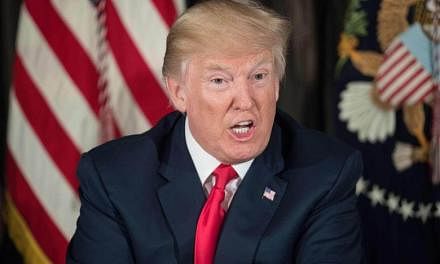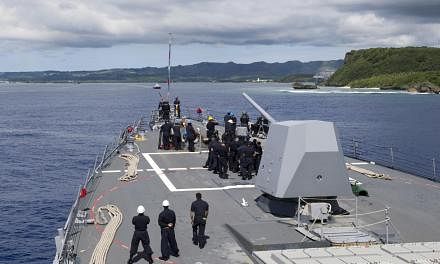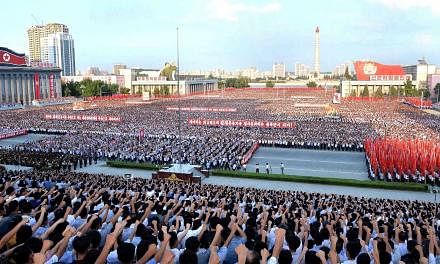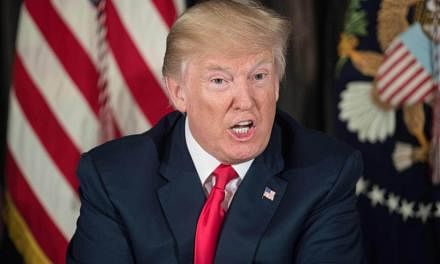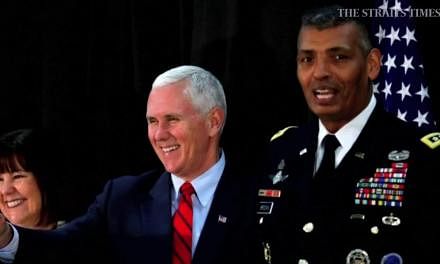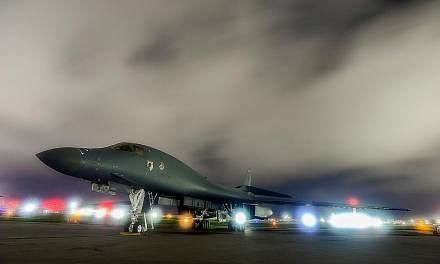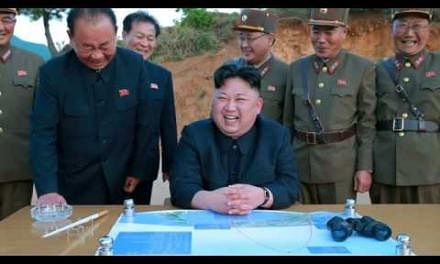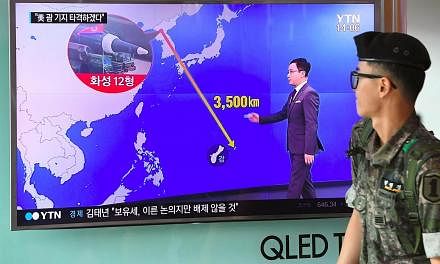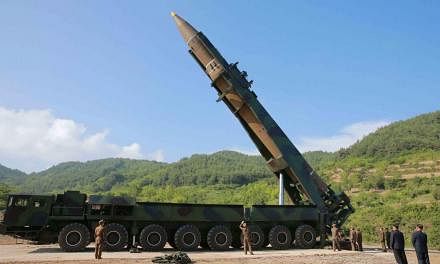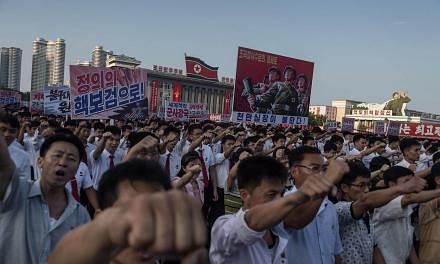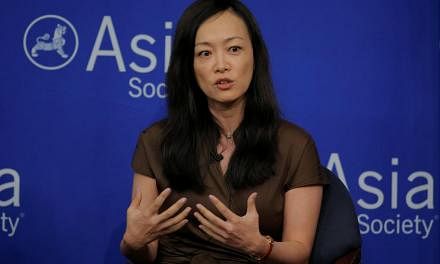TOKYO - North Korea will face "strong military consequences" if it were to launch a military strike at the United States or its allies, US Defence Secretary James Mattis said in Washington on Thursday (Aug 17).
He made the remarks at a joint news conference alongside US Secretary of State Rex Tillerson and their visiting Japanese counterparts, who also pledged to step up their defence cooperation against the North Korean threat.
Defence Minister Itsunori Onodera and Foreign Minister Taro Kono are in Washington for high-level "two-plus-two" talks in which the isolated regime had dominated the agenda.
"I just can assure you that, in close collaboration with our allies, there are strong military consequences if the DPRK initiates hostilities," Mr Mattis said, referring to North Korea by the acronym of its official name, the Democratic People's Republic of Korea.
Mr Tillerson added: "Our approach has been endorsed by the President."
Their comments have been seen as a direct rebuttal of a remark by White House chief strategist Steve Bannon, who told a US magazine earlier this week that there was "no military solution here" and that the threats by the isolated North was "just a sideshow".
Mr Onodera added: "In light of the threat of North Korea, the four of us confirmed the importance of the unwavering US commitment to extended deterrence."
In their joint statement, the US and Japan "condemned in the strongest terms North Korea's recurring provocations and development of nuclear and ballistic missile capabilities", saying they have entered a new phase and pose an increasing threat.
"Japan intends to expand its role in the Alliance and augment its defence capabilities, with an eye on the next planning period for its mid-term defence programme," the statement said. "The US remains committed to deploying its most advanced capabilities to Japan."
Such new areas include intelligence, surveillance and reconnaissance, training and exercises, research and development, capacity building, and the joint or shared use of facilities.
Mr Onodera is also believed to have mooted the possibility of Japan acquiring a third layer of protection against the North Korean threat, known as the "Aegis Ashore" system.
The Aegis Ashore system, to be developed by Lockheed Martin, the world's biggest weapons manufacturer, is the land-based version of the Standard Missile-3 (SM-3) advanced radar units mounted on Aegis warships. The SM-3 can intercept ballistic missiles outside the earth's atmosphere by up to an altitude of 500km.
Separately, Japan also has 34 units of the Patriot Advanced Capability-3 (PAC-3) missile interceptor system, which has limited range: it can destroy targets at altitudes of only between 10km and 20km.
The meeting between the Japanese and American defence and foreign ministers came as North Korea has demonstrated progress in its ballistic missile and nuclear programme that it said is necessary to deter a US-led invasion.
Last week, it threatened to lob a volley of four missiles into waters around Guam after US President Donald Trump said he would unleash "fire and fury like the world has never seen" on North Korea, which last month had successfully launched two inter-continental ballistic missiles. Both sides have since toned down their rhetoric.
Mr Mattis and Mr Tillerson, who had in a joint opinion piece to the Wall Street Journal on Sunday said the US had no interest in regime change, stressed economic and diplomatic pressure to bring North Korea back to the negotiation table. Military action, they said, would be the last resort.
Mr Tillerson said talks with Pyongyang were possible, but only if they prove to be meaningful. He said: "Our effort is to cause them to want to engage in talks but engage in talks with an understanding that these talks will lead to a different conclusion than talks of the past."
Tokyo's long-held position, most recently reiterated by Japanese Prime Minister Shinzo Abe in a phone call to US President Donald Trump on Tuesday, was that "dialogue for the sake of dialogue is meaningless".
Japanese media reports said this week that North Korean foreign minister Ri Yong Ho was believed to have broached the topic of dialogue with Mr Kono when the duo briefly met on the sidelines of an Asean meeting in Manila earlier this month.
In Washington on Thursday, Mr Kono continued to stress the need for China to turn up the pressure on the North by taking "specific measures to make (it) change its behaviour".
China contributes to as much as 90 per cent of the North's economy. But while seen as a major political ally, it voted in favour of a new set of United Nations Security Council sanctions that were adopted earlier this month.
As part of the new sanctions, China has since Tuesday halted the imports of iron, iron ore and seafood from North Korea, on top of a suspension of coal imports since February.
Meanwhile, the increasing Chinese assertiveness in the East and South China Seas was also on the agenda. Chinese vessels have encroached into waters near the disputed Senkaku/Diaoyu islets in the East China Sea with increasing regularity.
Japan does not have any claims in the South China Sea, where China uses the nine-dash line to justify its capacious claims in the waterway. But states such as Vietnam and the Philippines have benefited from Japan's support through training and provision of vessels.
Mr Kono on Thursday said Japan will pump in US$500 million (S$683 million) to help boost maritime security in East Asia.


